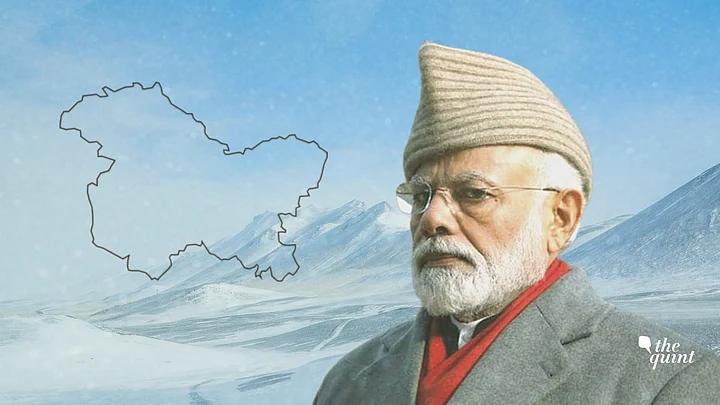It’s raining development sops in the Kashmir Valley this monsoon, never mind the fact that Jammu and Kashmir is doing much better on development indicators – such as income and health – compared to some of the laggard states in India, and is not too far from the better ones.
Prime Minister Narendra Modi's 'Sabka Saath, Sabka Vikas' train crossed the Banihal tunnel into the Valley – which is on lockdown – as he spoke in a nationwide address with a sense of detail and turns of phrase that should make an average Indian's heart melt.
Too busy to read? Listen to this instead.
But then, the ‘Valley of discontent’, known for flaming chinar trees, is not going to be easily impressed, given its baggage of historical woes and hysterical politics.
‘Naya Kashmir’
The big question after Parliament passed a law with bulldozer speed this week to demolish Article 370 of the Constitution: What next from the PM, in a promised attempt at integrating the state with the rest of India?
His speech would have impressed the naive and the simple as he mixed lyrical alliteration that sang praises of Kashmir's tea, saffron and special fruit (Kehwa, Kesar, Khubani) and everything from solar power and IT/BPO jobs as part of his "vikas" package.
Look beyond the obvious, and there is a subtext of subterfuge to upstage the reigning monarchs of that political privy purse called Article 370 of the Constitution, that kept non-Kashmiris out of law-making and land-buying in the state.
Modi's roughly 50-minute address to the nation was, in effect, an attempt to ride a demographic transition in Kashmir so that hundreds of thousands of youths disenchanted with the Tweedledum of the Abdullah-family-led National Conference and the Tweedledee of Mehbooba Mufti's People's Democratic Party (PDP) will spot new opportunities in the PM's "Naya Kashmir" pitch, and heed to his explicit call that "talented, energetic youths" will bring up the ranks of elected leaders in Jammu and Kashmir's state Assembly.
You heard that right. Modi promised to restore the Assembly ‘ASAP’ (as soon as possible), which means the BJP at the Centre is at least in theory keen to retrace two steps from its Article 370 abolition package – the demotion of the state to Union territory and the suspension of its Assembly.
Sabka ‘Vishwas’, Sabka ‘Vikas’
Politically speaking, Modi's trust and hope seems to be a bet on what Kashmir expert David Devadas described as "the Generation of Rage" in his latest book.
If that rage could be harnessed as a positive energy and given a political shape as well, it could be a double dream come true for the BJP: The end of identity-centric, corruption-tainted politics practised by the local duopoly of the NC and the PDP on the one hand and the identification of Kashmir's youths, of late famous only for stone pelting, with counterparts from Punjab, UP, Bihar and beyond to open a new chapter for the Indian Republic.
You may well call it a fairytale script to turn a political rebellion into a development uprising. From IITs and IIMs to food processing industries; from roads and army jobs to property rights for daughters, there was no development plank uncovered in Modi's speech.
But the path to a happy ending in this fairytale plan has many ifs and buts on its way. Investors may not heed Modi's call, especially when the rest of the country is tut-tutting over a directionless economic strategy and banks drag their feet on industrial loans.
Economics may not provide all the answers to youths, whose concerns oscillate between outrage at political alienation and insecurity in a land where terror attacks and military hunts are part of everyday life.
Last but not least, neither the disenfranchised masters of Article 370 politics, nor Pakistan-backed extremists espousing Islamism are likely to rest easy in a state where politics has routinely sidestepped development issues to talk of jihad at worst and Kashmiriyat at best.
The shrewd part of Modi’s address included better allowances, matching the rest of India, for Jammu and Kashmir’s government employees and praise for J&K’s police.
In a state where government workers have been accused of playing footsie with separatists, that is a clear incentive for co-option, one that the BJP must hope would win over hearts in its 'Sabka Vishwas' (everybody's trust) mode.
With the Valley under a curfew, with the Pakistan National Assembly holding a special session to protest the dumping of Article 370, and with President Donald Trump offering mediation on what India says is an internal affair, the ‘vikas’ card will likely be distracted by international attention.
For starters, we need to know how the generation of rage displays its feelings over the bulldozing of Article 370. Early signs show that there has been no end to stone-pelting protests while 500 political leaders and/or activists have been detained by the Modi government and its extended arm in the Centre-ruled state administration.
Lessons From Demonetisation?
Modi's speech would likely assure Indians across the country that he was trying hard to use development to integrate Kashmir. But problems of Kashmir cannot be solved in Mumbai, Lucknow or Bangalore.
To begin with, the BJP must educate its own cadres gloating in a cocktail of Muslim-othering and jingoist talk on Pakistan to be more sensitive.
Government officials, investors and development organisations must all walk Modi’s talk, and this is not as easy as issuing orders from the top. Businessmen love incentives and avoid risks.
For the moment, Modi's speech smells mildly of hope after three days of confusion and despair over Article 370.
In his quieter moments, the prime minister may want to recall what happened after his 2016 demonetisation of high-value currency notes, that offered a clear lesson: Rearguard action is hardly a substitute for a well-planned strategy.
(The writer is a senior journalist who has covered economics and politics for Reuters, The Economic Times, Business Standard and Hindustan Times. He tweets as @madversity)
